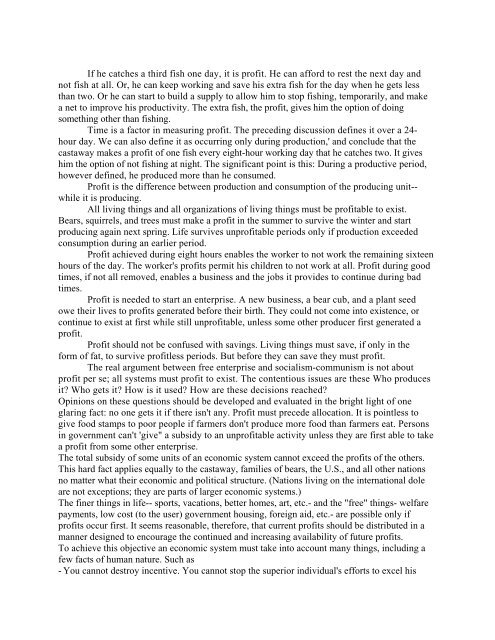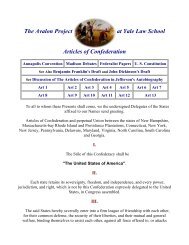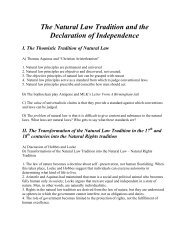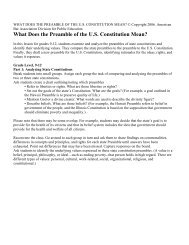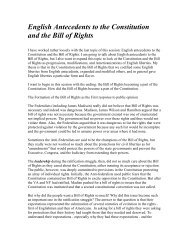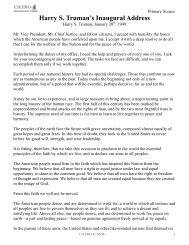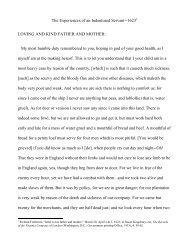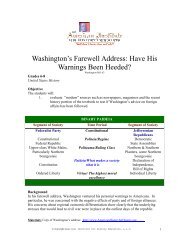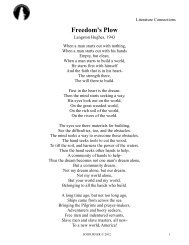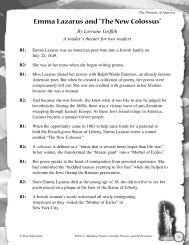Economic Development - American Institute For History
Economic Development - American Institute For History
Economic Development - American Institute For History
Create successful ePaper yourself
Turn your PDF publications into a flip-book with our unique Google optimized e-Paper software.
If he catches a third fish one day, it is profit. He can afford to rest the next day andnot fish at all. Or, he can keep working and save his extra fish for the day when he gets lessthan two. Or he can start to build a supply to allow him to stop fishing, temporarily, and makea net to improve his productivity. The extra fish, the profit, gives him the option of doingsomething other than fishing.Time is a factor in measuring profit. The preceding discussion defines it over a 24-hour day. We can also define it as occurring only during production,' and conclude that thecastaway makes a profit of one fish every eight-hour working day that he catches two. It giveshim the option of not fishing at night. The significant point is this: During a productive period,however defined, he produced more than he consumed.Profit is the difference between production and consumption of the producing unit--while it is producing.All living things and all organizations of living things must be profitable to exist.Bears, squirrels, and trees must make a profit in the summer to survive the winter and startproducing again next spring. Life survives unprofitable periods only if production exceededconsumption during an earlier period.Profit achieved during eight hours enables the worker to not work the remaining sixteenhours of the day. The worker's profits permit his children to not work at all. Profit during goodtimes, if not all removed, enables a business and the jobs it provides to continue during badtimes.Profit is needed to start an enterprise. A new business, a bear cub, and a plant seedowe their lives to profits generated before their birth. They could not come into existence, orcontinue to exist at first while still unprofitable, unless some other producer first generated aprofit.Profit should not be confused with savings. Living things must save, if only in theform of fat, to survive profitless periods. But before they can save they must profit.The real argument between free enterprise and socialism-communism is not aboutprofit per se; all systems must profit to exist. The contentious issues are these Who producesit? Who gets it? How is it used? How are these decisions reached?Opinions on these questions should be developed and evaluated in the bright light of oneglaring fact: no one gets it if there isn't any. Profit must precede allocation. It is pointless togive food stamps to poor people if farmers don't produce more food than farmers eat. Personsin government can't 'give" a subsidy to an unprofitable activity unless they are first able to takea profit from some other enterprise.The total subsidy of some units of an economic system cannot exceed the profits of the others.This hard fact applies equally to the castaway, families of bears, the U.S., and all other nationsno matter what their economic and political structure. (Nations living on the international doleare not exceptions; they are parts of larger economic systems.)The finer things in life-- sports, vacations, better homes, art, etc.- and the "free" things- welfarepayments, low cost (to the user) government housing, foreign aid, etc.- are possible only ifprofits occur first. It seems reasonable, therefore, that current profits should be distributed in amanner designed to encourage the continued and increasing availability of future profits.To achieve this objective an economic system must take into account many things, including afew facts of human nature. Such as- You cannot destroy incentive. You cannot stop the superior individual's efforts to excel his


